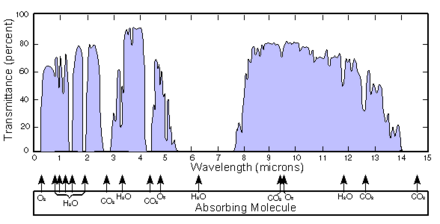J波段 (紅外線)

J波段是紅外天文學中,以1.25微米(在近紅外中)為中心的紅外窗口(1.1至1.4微米)。
參宿四是天空中最亮的近紅外光源,J波段星等為−2.99[1]。J波段下一顆最亮的恒星依序是心宿二(−2.7)、劍魚座R(−2.6)、大角星(−2.2)和畢宿五(−2.1)[2]。天狼星在J波段是第9亮的恒星。
因為它覆蓋的波長穿過雲和其他大氣氣體,因此J波段是地面觀測頻繁使用的紅外線波段[3]。 然而,波段確實受到水蒸氣和氫氧化物發射線的污染,導致光度的誤差相對較高[4]。
它可以用來仔細觀察巨星和超巨星的光球,同時主要避免分子帶的不透明性,還可以訪問1080nm的He I線,這在研究金牛T星周圍的星周盤相互作用中很有用[5]。
參考資料[编辑]
- ^ R. Cutri and M. Skrutskie. Very Bright Stars in the 2MASS Point Source Catalog (PSC). The Two Micron All Sky Survey at IPAC. 2009-09-07 [2011-12-28]. (原始内容存档于2011-12-04).
- ^ Simbad object query:Jmag<-2 & Vmag>-9. SIMBAD Astronomical Database. [2012-08-22]. (原始内容存档于2018-01-30).
- ^ Infrared Astronomy Optical Filters. www.andovercorp.com. [2023-04-01]. (原始内容存档于2023-04-01).
- ^ Simons, D. A.; Tokunaga, A. T. The Mauna Kea Observatories Near-Infrared Filter Set. I: Defining Optimal 1-5 $\mu$m Bandpasses. Publications of the Astronomical Society of the Pacific. February 2002, 114 (792): 169–179. ISSN 0004-6280. S2CID 7880289. arXiv:astro-ph/0110594
 . doi:10.1086/338544.
. doi:10.1086/338544.
- ^ Pedretti, Ettore; Piacentini, S.; Corrielli, G.; Osellame, Roberto; Minardi, Stefano. Tuthill, Peter G.; Creech-Eakman, Michelle J.; Mérand, Antoine , 编. A six-apertures discrete beam combiners for J-band interferometry. Optical and Infrared Interferometry and Imaging VI (SPIE). 2018-07-09, 10701: 316–325. Bibcode:2018SPIE10701E..16P. ISBN 9781510619555. S2CID 119458175. arXiv:1809.01260
 . doi:10.1117/12.2312033.
. doi:10.1117/12.2312033.
| |||||||||||||||||||||||||||

